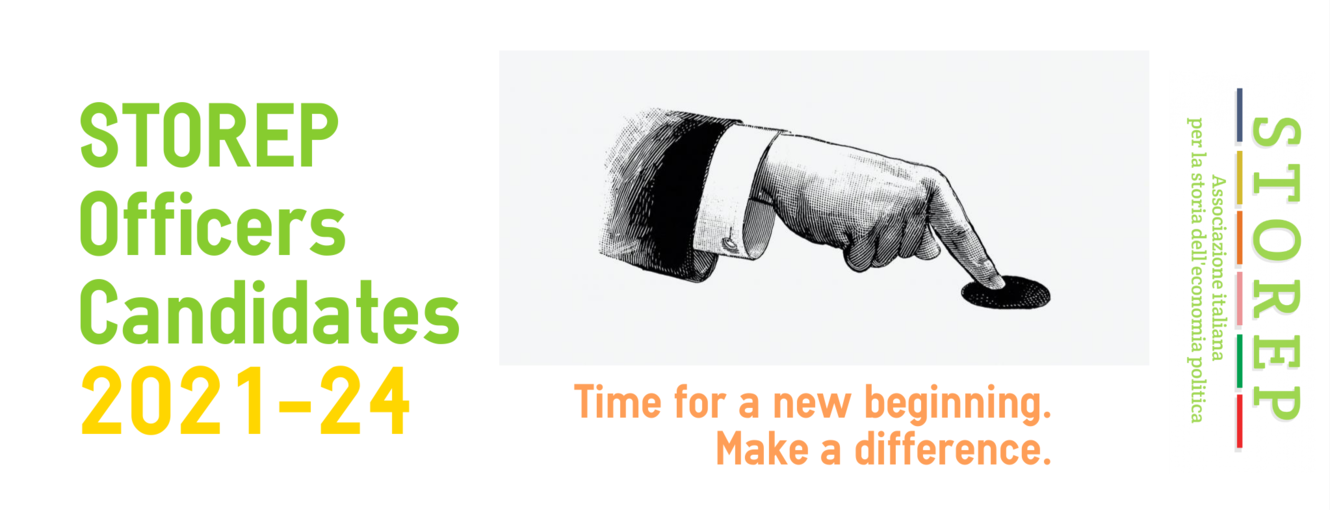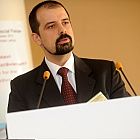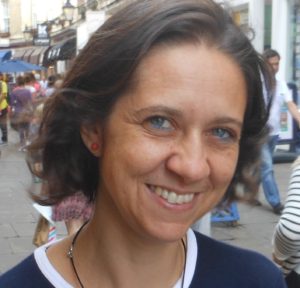Elections of STOREP officers, 2021-2024: Candidates

Elections of STOREP officers (President, Secretary, Members of the Executive Committee, Auditors, and, in a separate ballot, Young Scholars Representative) for the next triennium will be held in March, 2021.
Only current members (that is, scholars who have become member in 2021 or renewed their membership for the current year) shall be entitled to vote. Memberships can be renewed by following the instructions at this link.
Voting instructions will be posted on this website and notified to members shortly.
Here below is the list of candidates, with profiles and photos.
* * *
PRESIDENT
 Enrico Bellino (Università Cattolica del Sacro Cuore, Piacenza)
Enrico Bellino (Università Cattolica del Sacro Cuore, Piacenza)
Enrico Bellino is Full Professor of Political Economy at the Università Cattolica del Sacro Cuore, Piacenza. He graduated in Economics (Università Cattolica del Sacro Cuore, Milan) in 1989 and obtained his Phd in Economics (University of Pavia) in 1993. He has been visiting researcher at the Manchester Metropolitan University (1996), at CEPREMAP, Paris (1996) and at CORE, Louvain-la-Neuve (2000).
His research interests include the classical and Keynesian theory of production, employment, value and income distribution. He has penned about thirty scientific contributions, all published in academic journals (including Cambridge Journal of Economics, Contributions to Political Economy, Structural Change and Economic Dynamics, Metroeconomica, Economia politica, Journal of Economics, The Manchester School Journal) and in collected books.
He is publishing a book on Production, Employment and Income Distribution – A Classical-Keynesian Approach (Routledge, forthcoming) and is editing, together with Sebastiano Nerozzi, the collected volume Pasinetti and The Classical-Keynesians – Nine Methodological Issues (Cambridge University Press, forthcoming). He is editor of Metroeconomica and Director of the Department of Economic and Social Sciences of Università Cattolica del Sacro Cuore, Piacenza. He has been a member of the STOREP Executive Committee between 2012 and 2018, as well as of the SIE (Italian Economic Association) Board between 2016 and 2019.
Full CV here.
* * *
SECRETARY-GENERAL
 Angela Ambrosino (Università di Torino)
Angela Ambrosino (Università di Torino)
Angela Ambrosino is Assistant Professor of History of Economic Thought at the Department of Economics and Statistics of the University of Turin, Italy, where she teaches economics.
STOREP member since the Association’s first conference in 2004, she has served as member of the Executive Committee for the years 2015-18 and 2018-21. She is a member of the Committee of Archivio Storico delle Economiste ed Economisti – ASEE (since 2020) and of the Scientific Committee of the Turin School of Local Regulation, Fondazione Tebaldo Fenoglio (since 2012).
She has published several articles concerning institutional economics, from a history-of-economic-thought and a history-of-economics perspectives. Her research interests also include economic methodology and the relationship between economics and other disciplines.
Managing Editor of The Annals of the Fondazione Luigi Einaudi (since 2021), she has recently published “Shifting Boundaries in Economics: The Institutional Cognitive Strand”, Journal of Economic Surveys, 2018 (with M. Fontanta and A. Gigante), “Mauss’s The Gift, or the Necessity of an Institutional Perspective in Economics”, Journal of Institutional Economics, 2020 (with M. A. Cedrini, R. Marchionatti, and A. Caillé), as well as “Interdisciplinarità nella teoria economica: riflessioni sulle spalle di Paolo Sylos Labini”, Moneta e Credito, 2020 (with L. Storti).
Full CV here.
* * *
EXECUTIVE COMMITTEE
 Mario Cedrini (Università di Torino)
Mario Cedrini (Università di Torino)
Mario Cedrini (born 1977) is Associate Professor of History of Economic Thought at Università di Torino, Italy, where he teaches macroeconomics, international economics and globalization, economics as science, planetary boundaries and economic paradigms. He also teaches distant reading in the history of ideas at the Scuola di Studi Superiori “Ferdinando Rossi”.
His work has mainly focused on Keynes’s thought, epistemological and methodological reflections, and suggestions for global reform. His current research project focuses on economics as discipline, also in relation to other social sciences. He has been awarded an ESHET grant in 2015, and then a research grant by the Italian Ministry of Education, University and Research (Research Programme of Relevant National Interest, PRIN 2017) to explore, by means of text mining techniques for mapping disciplines, whether economics has finally become, at a time of pervasive specialization, and increasing fragmentation… an “immature” science.
One of the four editors of The Annals of the Fondazione Luigi Einaudi, he has published Economics as Social Science. Economics Imperialism and the Challenge of Interdisciplinarity (with R. Marchionatti, Routledge 2017), and Secondo Keynes. Il disordine economico internazionale e le speranze di una nuova Bretton Woods (with A. Carabelli, Castelvecchi 2014), as well as a series of articles in international economics journals (CJE, JoIE, JEM, EJHET, JPKE, JEI).
He has served as STOREP Secretary-General for the years 2015-2018 and 2018-2021.
Full CV here.
 Carlo Cristiano (Università di Pisa)
Carlo Cristiano (Università di Pisa)
Carlo Cristiano (born 1973) is Assistant Professor (RtdB) of Political Economy at Pisa University, Department of Law. He teaches Political Economy at Pisa and History of Economic Thought and Policy at LUISS University in Rome.
His main research interests are macroeconomics and economic policy in the Keynesian era, the history of the Cambridge school of economics, industrial economics, the history of Italian economic thought.
He has taken part in research groups on Marshallian industrial economics (coordinated by T. Raffaelli) and on Keynes as an investor in commodities and the stock exchange (coordinated by M.C. Marcuzzo). His current work on the history of the Phillips curve is a spin-off of precedent research (with P. Paesani) on the Radcliffe Committee and ‘unconventional monetary policy ante litteram’, which was financed by an ESHET ECB Grant. Over the last two years, he has also worked (with S. Nerozzi) at a complete catalog of Luigi Einaudi’s writings on banks and the stock exchange, which is now about to be published. His main publications include a book on Keynes as a young economist (Routledge, 2014) and “Price stability and the origins and early influence of the Phillips curve on British policy debates ” (with P. Paesani, History of Political Economy, 2018).
A STOREP member since 2005, he is also a member of the Associazione Italiana per la Storia del Pensiero Economico (AISPE) and the European Society for the History of Economic Thought (ESHET). In 2020, he has become a member of the ASEE (Archivio Storico delle Economiste e degli Economisti) Committee.
Full CV here.
 Giulio Guarini (Università della Tuscia)
Giulio Guarini (Università della Tuscia)
Giulio Guarini (Roma, 1976) is an Associate Professor of Political Economy at the Tuscia University (Viterbo, Italy). Previously, he was an economist at Italian Agency of Territorial Cohesion and at Italian Ministry of Economic Development. He graduated in Economics at Sapienza University of Rome, where he subsequently earned his PHD in Economics and where he had two Research Fellowships on Sylos Labini’s economic thought. He spent periods of study in UK at the University of Oxford and the University of Sussex.
Based on the Classical-postKeynesian approach, his main research interests are economic development, environmental sustainability, innovation, ecological macroeconomics, inequalities, human development. He is on the editorial board of Moneta e Credito, on the scientific board of Studium, and on the governing board of Economia Civile and of Centro Studi Europei e Internazionali at Tuscia University.
He is member of MinervaLab – Laboratory on Diversity and Gender Inequality at Sapienza University and of Structuralist Development Macroeconomics Research Group at Brasilia University. He has been collaborating for several years as scientific director of research projects with the Italian National Agency for New Technologies, Energy and Sustainable Economic Development (ENEA). He has published in several international and national journals.
Publications here.
 Danielle Guizzo (University of Bristol, UK)
Danielle Guizzo (University of Bristol, UK)
Danielle Guizzo is Senior Lecturer in Economics at the University of Bristol (UK), where she teaches history of economic thought and macroeconomics. Her research focuses on the history of economic thought, political economy and the philosophy and methodology of economics. Currently, she is working on projects that explore the history of policy-making and economic expertise in the 20th century, the history of heterodox economics, and the sociology of the economics discipline.
In 2019, she published a book on What is Heterodox Economics? Conversations with Leading Economists together with Andrew Mearman and Sebastian Berger (Routledge). She has published on several peer-reviewed journals, such as Review of Political Economy, Review of Keynesian Economics, Review of International Political Economy, Contributions to Political Economy, History of Economic Ideas, Review of Social Economy and Review of Radical Political Economics. In 2020, she joined the editorial board of Journal of Economic Issues and Cahiers d’Économie Politique.
Danielle is also the recipient of grants from academic associations such as the Association for Heterodox Economics and the History of Economics Society. In 2020 she was awarded a research grant from Rebuilding Macroeconomics (ESRC/NIESR) to explore the impacts of the Research Excellence Framework (REF) over UK academic macroeconomics. Besides STOREP, she is a member of the Association for Heterodox Economics, the History of Economics Society, the European Association for the History of Economic Thought and a co-founding member of D-Econ: Diversifying and Decolonising Economics.
Full CV here.
 Mario Morroni (Università di Pisa)
Mario Morroni (Università di Pisa)
Mario Morroni is Adjunct Professor of Economics at the University of Pisa and Life Member of Clare Hall, College for Advanced Study, University of Cambridge (G.B.).
He authored a book on technical change and production processes (Cambridge University Press, 1992), which received the Myrdal Prize, and a book on the theory of the firm (Cambridge University Press, 2006).
He is author of several works in the areas of microeconomics, macroeconomics, labour economics and industrial economics. He has recently published a book with nine dialogues among economists with different theoretical positions on the consequences of neoliberal economic policies that have been implemented over the last thirty years (Springer, 2018). The dialogues discuss increasing inequality, the rolling back of welfare systems, the relationship between the state and the market, the Eurozone crisis, environmental degradation, and the industrial policies in the face of globalization.
Among other recent publications are “Time in production economics: A brief historical excursus”, History of Economic Ideas, 2020 (with G. Vittucci Marzetti); “Production of commodities by means of processes. The flow-fund model, input-output relations and the cognitive aspects of production”, Structural Change and Economic Dynamics, 2014; “Incentive-based and knowledge-based theories of the firm: Some recent developments”, Economia e Politica Industriale – Journal of Industrial of Business Economics, 2010 (with N. Meccheri); “Energy transition towards economic and environmental sustainability: feasible paths and policy implications”, Journal of Cleaner Production, 2010 (with S. D’Alessandro and T. Luzzati).
Full CV here.
 Paolo Paesani (Università di Roma “Tor Vergata”)
Paolo Paesani (Università di Roma “Tor Vergata”)
Paolo Paesani (born 1973) is Associate Professor of History of Economic Thought at Università degli Studi di Roma “Tor Vergata”, Italy, where he teaches History of economic thought, Economic policy, Global economics. He also teaches HET at the University Lyon2 Lumière (Programme Minerve).
His work focuses on the theory of speculation, post-war macroeconomic theory and policy, history of European economic integration. He has recently published “How speculation became respectable: early theories on financial and commodity markets” (European Journal of the History of Economic Thought, 2020) with A. Rosselli, “Luigi Spaventa e l’integrazione monetaria europea: un pensiero in evoluzione” (Pensiero Economico Italiano, 2020), “Unconventional monetary policy ante litteram: Richard Kahn and the monetary policy debate during the works of the Radcliffe Committee”, (Cambridge Journal of Economics, 2017), with C. Cristiano. In 2021, he will co-edit with M.C. Marcuzzo, a volume of Richard F. Kahn’s Collected economic essays with Palgrave.
He is active in the promotion of HET studies in Italy, introducing a course in HET in the Economics and business curriculum of his university and participating in a research project (funded by his university) in the field of Business history. He has been a member of the Italian Association for the History of Political Economy (STOREP) since 2009 and a member of STOREP Executive Committee in the period 2018-2021. He is also a member of the European Society for the History of Economic Thought (ESHET) and of the Associazione per la Storia Economica (ASE).
Full CV here.
 Antonella Palumbo (Università Roma Tre)
Antonella Palumbo (Università Roma Tre)
Antonella Palumbo, PhD in economics at Sapienza University of Rome, is Associate Professor of Economics at Roma Tre University.
She published articles in various journals (among which Structural Change and Economic Dynamics, Review of Keynesian Economics, Review of Political Economy, European Journal of the History of Economic Thought), and in collective volumes. She co-authored the 3-volume book Sraffa and the Reconstruction of Economic Theory (Palgrave Macmillan, 2013) and is one of the managing editors of the Centro Sraffa Working Papers. She is member of the editorial board of Cahiers d’Économie Politique and associate editor of the Review of Keynesian Economics.
She has been visiting professor at Korea University, Universidad Nacional Autónoma de México, Azim Premji University (Bengaluru) and University of Hyderabad; and invited speaker in international seminars and conferences.
Her research interests are in the theory of value and distribution and in the theories of demand-led growth. She contributed to the theoretical analysis of the Classical-Keynesian approach with contributions on classical and pre-classical theories of value; exports and growth; Kaldorian models of growth; criticism to steady-growth models; theoretical and empirical analysis of potential output; empirical measures of full employment; Phillips curve.
Full CV here.
 Antonella Rancan (Università del Molise)
Antonella Rancan (Università del Molise)
Antonella Rancan is associate professor of Economics at the University of Molise (Italy) where she teaches Economics and History of Economic Thought. Her research interests are in the history of postwar macroeconomics with special attention to Keynesian economics and the history of macroeconomic modelling, monetary theory and policy.
She has spent research periods at the Department of Economics of Duke University in 2007 and 2008, and at the Center for the History of Political Economy (Duke University) during 2018 thanks to a Fulbright research scholar grant, and the Center fellowship, working on Franco Modigliani Papers. She has recently published Franco Modigliani and Keynesian Economics (Routledge 2020) and she is currently researching in the history of macroeconometric modelling in U.S., at the Bank of Italy and the European Commission (with Juan Acosta and Francesco Sergi) enlarging the perspective from macroeconomics within academia to macroeconomics practiced within institutions.
Her articles have been published in international journals such as History of Political Economy, European Journal of the History of Economic Thought, Journal of the History of Economic Thought. She has served as Auditor of accounts for STOREP from 2015 to 2018 and from 2018 to 2021, and is council member of the European Society of the History of Economic Though since September 2020.
Full CV here.
 Eleonora Sanfilippo (Università di Cassino e del Lazio Meridionale)
Eleonora Sanfilippo (Università di Cassino e del Lazio Meridionale)
Eleonora Sanfilippo, PhD in Economics at the University of Siena (2000). She is Associate Professor of Economics at the Department of Economics and Law, University of Cassino and Southern Lazio. She actually teaches there macroeconomics and history of economic thought courses, both in Italian and English.
She regularly participates to international conferences on her fields of interests, presenting her papers and discussing papers of others. She was invited speakers in seminars abroad (e.g. at the Robinson College, Cambridge, UK, 2012; Sophia University, Tokyo and Hitotsubashi University, Tachikawa, 2006 and 2015).
Her research interests mainly concern: (i) Keynes’s theory and practice as an investor and speculator, (ii) Cambridge economists; (iii) methodology in macroeconomics and (iv) consumption theory, in both micro- and macroeconomic analysis.
Besides papers appearing in Cambridge Journal of Economics and History of Political Economy, she has also published articles in the following Journals: European Journal of the History of Economic Thought, Journal of Economic Psychology, Review of Political Economy, History of Economic Ideas, and History of Economic Thought and Policy. For several of these Journals, she has also acted as reviewer and referee. Since 2014, she has been a member of the ESHET Council.
Full CV here.
 Giulia Zacchia (Università La Sapienza, Roma)
Giulia Zacchia (Università La Sapienza, Roma)
Giulia Zacchia is research fellow in economics at the Department of Statistics of Sapienza University of Rome, where she teaches Financial Markets & Institutions and Gender Economics both in the Department of Statistics and in the Global Humanities academic program in Sapienza university. She collaborates with Minerva – Laboratory on Gender Diversity and Gender Inequality (https://web.uniroma1.it/labminerva/en). She holds a PhD in History of Economic Thought.
Her research interests extend to social and financial inclusion, gender economics and gender gaps in labor markets and in academia. Her on-going research projects are on the impact of sexual harassment on wage gaps and on the identification of the contribution of women to the development of the economic thought, trying to remove the ignorance about who were the women pioneers of economics.
She is also involved in international projects working with Tanzanian and Ugandan Universities within an Erasmus+ project (DALILA) on green economics where she is responsible for the green economics courses that will be implemented in the partners’ local universities. She is also working as research unit in a European project that aims at visualizing and measuring the role of Industrial Relations in Addressing Gender Equality (VIRAGE) financed by European Commission and coordinated by the CEPS.
Full CV here.
* * *
AUDITORS OF THE ACCOUNTS
 Enrico Petracca (Università di Bologna)
Enrico Petracca (Università di Bologna)
Enrico Petracca is a Research Associate at the School of Economics, Management and Statistics at the University of Bologna. He holds a Ph.D. in history and philosophy of science from the University of Bologna (2014).
His research interests are at the intersection between philosophy of economics and philosophy of mind.
He served on the STOREP Board as Young Scholar Representative from 2015 to 2018, and as STOREP Auditor of accounts from 2018 to 2021.
Full CV here.
 Riccardo Pariboni (Università di Siena)
Riccardo Pariboni (Università di Siena)
Riccardo Pariboni is Senior Researcher in Economics at DEPS, University of Siena, where he teaches Macroeconomics and International Economics. Previously, he was a Postdoctoral Research Fellow at Roma Tre University and at the Max Planck Institute for the Study of Societies, Cologne and a Lecturer at Freie Universität, Berlin.
His research focuses on economic growth, causes and macroeconomic consequences of inequality, welfare systems and financial crises. His latest publications include “Housing is NOT ONLY the Business Cycle: A Luxemburg-Kalecki External Market Empirical Investigation for the United States”, Review of Political Economy, 2021 (with José A. Pérez-Montiel); “Structural change, institutions, and the dynamics of labor productivity in Europe”, Journal of Evolutionary Economics, 2020 (with Pasquale Tridico); “Labour share decline, financialisation and structural change”, Cambridge Journal of Economics, 2020 (with Pasquale Tridico); “Normal utilization as the adjusting variable in Neo-Kaleckian growth models: a critique”, Metroeconomica, 2019 (with Daniele Girardi).
Full CV here.
 Rodolfo Signorino (Università di Palermo)
Rodolfo Signorino (Università di Palermo)
Rodolfo Signorino is Associate Professor in Economics at the Faculty of Law of the University of Palermo, where he teaches Economics.
His main research interests are in the history and methodology of economic analysis. He has published several articles on Classical and Sraffian economics in Italian and international Journals. He has also co-authored some chapters and entries in collective volumes. He has written with some co-authors the two-volume book Istituzioni di Economia Politica (Foundations of Economics), Giappichelli, 2008 (2nd edition), in Italian. With Giuseppe Freni, Heinz D Kurz and Mario Lavezzi, he has co-edited Economic Theory and its History (Routledge, 2016).
He is also a member of the Editorial board of the European Journal of the History of Economic Thought. His latest publications concern the issue of international trade and structural change within Classical economics.
Full CV here.
* * *
YOUNG SCHOLARS REPRESENTATIVE
Oleksandra Sokolenko (Università Roma Tre) 
Oleksandra Sokolenko is a PhD student in Economics at Roma Tre University.
She holds a Master in Cooperation, Development and Innovation in the Global Economy from the University of Torino, and a Master from the Economic Policies in the age of Globalization (EPOG) program from the University Paris 13.
She co-founded Rethinking Economics Torino—a branch of the student network demanding and promoting pluralist teaching at the theoretical, methodological and multidisciplinary level—which got her involved on the local, national and international level. She is a member of the Young Scholars Initiative (YSI), where she is acting as one of the organizers of the Political Economy of Europe Working Group.
She has been involved with STOREP since 2015, participating to conferences and helping organize young scholars sessions. In 2018 she collaborated on a research project titled “A Survey of Economics Teaching at Italian Universities”, which received a STOREP grant.
